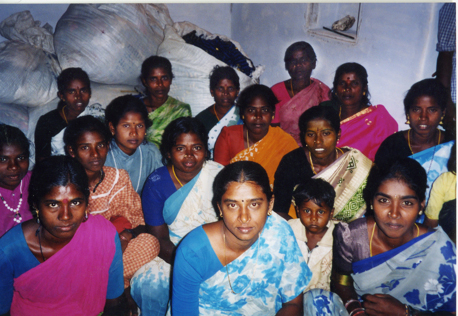
This story is about the women of small villages in southern India, how I met them and what I learned from them. It is also about five powerful spiritual lessons and the mysterious ways of Spirit that I learned along that journey.
It began over 15 years ago with photos in an issue of an international wildlife magazine: a dark-skinned woman from Botswana digging a hole deep in the ground to find precious (but visibly brown) water; another woman from Bhutan, a ring in her nose, holding a baby, with two other children at her side; a third determined-looking Peruvian woman with a baby wrapped in brightly colored cloth strapped to her back.
I was reminded of how I felt when I was abruptly faced with the challenge of raising three children as a single parent. Although it was difficult, I had the support of family and friends. I went to graduate school to get a master’s degree in counseling, which helped me secure a good job. But who would help the women in the photos? I felt helpless and far away from them. What could I do, in Missoula, Montana, to address the enormous inequity between my life and theirs? Over time, from yard sales and a challenge donation, my monthly meeting raised $6,000 to send to Right Sharing of World Resources (RSWR). I found that letting go of my old stuff gave me energy, a cleaner home, and an opening to a deeper understanding of simplicity. Of course, the donated items also helped others.
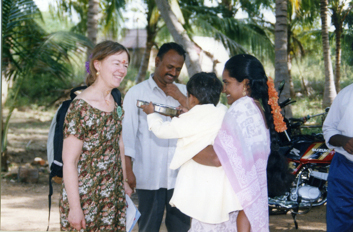
RSWR has appealed to Friends since its inception as the “One Percent Fund” following the 1967 World Gathering of Friends, organized by Friends World Committee for Consultation (FWCC). The purpose of the fund was to encourage Friends to individually give one percent of income to projects that benefit the poorest nations, an act which collectively would stimulate “right sharing of the world’s resources.”
When my yearly meeting asked me to be a representative to FWCC, I agreed, largely because I thought (mistakenly) that I would travel to the upcoming triennial in England and also because of my interest in RSWR. Spiritual lesson #1: Our original motivations for pursuing new endeavors may be less than noble, but God has a way of using us anyway.
When I first met with RSWR, they had a strong clerk and many committee members, but then suddenly, the clerk was no longer able to serve, and no one among the more experienced committee members was able to fill the opening, leaving me to serve as clerk by default. I felt rather inadequate for the task. Spiritual lesson #2: What you think you are called to do is often not what Spirit has in mind for you.
What happened next further defied my expectations. FWCC was undergoing significant change, a transition that began after the organization recognized that its strength was in its consultation role, not in administering the cumbersome details of international programs. RSWR was to be “released,” which at the time felt more like being booted out, though clearly it was ultimately good for the organization. At a decision-making meeting, I wept, embarrassed, and asked for a Bible. I quickly found Matthew 25:40: “Truly, I say to you, as you did it to one of the least of these my brethren, you did it to me.” What about this clear message from Jesus? Spiritual lesson #3: What I can see in the moment has truth, but is not the whole truth, only the Light as I am given to see it.
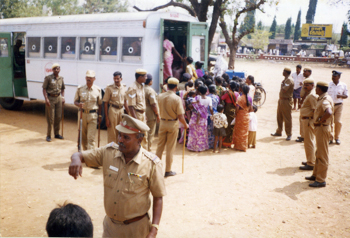
At that time all I could see was my leading to help RSWR survive as an independent entity, which it did and has since grown dramatically. When in doubt, I would return to the photos of those women. They wanted a future for their children; they needed food, shelter, clothing, and decent water. I felt I had these things in abundance by sheer luck. What was my responsibility to them?
My professional work as an in-home family therapist has given me deep awareness of the sexual inequalities that exist between men and women and of the harsh realities faced by female-headed poor families in this country. Such families are deemed “broken,” despite the mother doing the best she can as the only parent to her children. The plight of a single woman with children must be even more difficult in a poor country. How does the testimony of equality speak to her?
A few years after RSWR became an independent organization in 1999, Roland Kreager, then its general secretary, asked if I would like to visit its projects in India. I didn’t hesitate to say happily, “Yes, of course!”
It is not so easy for a shy woman traveling alone to fly from Missoula to Minneapolis, to Amsterdam, then to Mumbai, and finally to Madurai, a city in southern India’s Tamilnadu state. I wish I could say that my motives were always noble, but I also saw it as an incredible opportunity to see southern India. My ego was aware of the honor afforded me. Unfortunately, I am not the world’s best traveler and found myself vomiting in the restroom of the Amsterdam airport, aggravated by a major migraine and a reaction to an antimalarial drug. Spiritual lesson #4: Even when clearly led, we can experience moments of feeling well beyond our Light, true moments of despair in which we would give anything to release the leading and just go back home.
But Way opens, so curiously: my flight was delayed for 24 hours, giving me a chance to recover. I arrived in Tamilnadu to a gracious reception. As a representative of RSWR, I was greeted with garlands of roses and marigolds, sand paintings of the world, songs, and even a baby whom I was given the honor of naming!
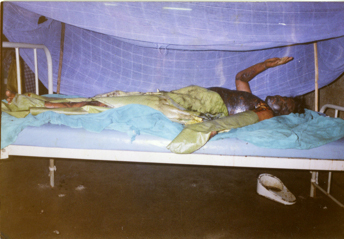
My leading had become real to me at last. Women like those in the photos are real and their stories are powerful. These women in front of me wanted their children to go to school, to have enough food, to have hope for their futures. I sat on the floor or ground with the women, refusing the chair that was offered to me. I may have been the first Anglo woman traveling alone to visit RSWR projects (although I was accompanied by our field representative, Dr. R. Kannan).
Everywhere I went I asked questions and listened carefully to the answers. I began to really “get it” that the work of RSWR is not just about cool micro-enterprise projects; it’s more about addressing the inequities of culture, gender, and economics. Spiritual lesson #5: Yes, the passage from Matthew is profound and applicable to this work, but on an even deeper level, it is not a matter of giving our largesse, but the much more radical notion of a right order of living.
Women in India are legally afforded rights comparable to those of women in more developed countries, but old customs and traditional deference to men interfere with the assertion of these rights, especially by the poor. Women are expected to solve financial problems, such as covering the costs of weddings and illnesses. Village moneylenders charge exorbitant rates of interest (such as 120 percent per year), resulting in perpetual debt and the threat of financial ruin. I have seen the micro-businesses of these women transform their lives and the lives of their families; even a very small amount of savings can protect a family.
Individually, these women have little or no voice, but I learned that the village women in southern India have a powerful voice when they join together in their self-help groups called sangams. In one example, a woman (we’ll call her Jyoti) was very sad because her husband left her for another woman in the village. Jyoti wanted her husband to come home. She appealed to the sangam, whose members then went en masse to remonstrate with the husband. He finally returned to Jyoti and the “other” woman was invited to become a member of the sangam. There is a radical inclusiveness to this reconciliation that is hard not to appreciate.
In the West, we tend to credit Mahatma Gandhi with the origin of nonviolent demonstration as a catalyst for social change, but the concept of satyagraha, a term coined by Gandhi, has deep roots in an ancient tradition. The practice involves building pressure through peaceful but determined group protest, and it can result in the empowerment of women on an individual level. Economic equality goes hand-in-hand with sexual ethics, both in North America and Tamilnadu. When women are empowered by the combination of small savings accounts and peaceful demonstrations, they can accomplish wonders.
The Society for Women’s Education and Economic Development (SWEED) is deeply concerned with the problem of child marriage and the custom of girls marrying their uncles. Such practices eliminate the requirement of a dowry, but pairing impatient young men and child brides can lead to the births of many disabled children. During my stay, SWEED used street theater to educate and empower women. Even without knowing the Tamil language, I could follow the storyline with all its pathos and warning.
I also visited the Rural Organization of Social Education (ROSE), where I learned about land reclamation, mulching, and the use of an herbal concoction for pest control. After the local landlord destroyed the community’s earthen water tank, the women’s sangam organized demonstrations. Initially, about 300 women (with children in arms) were arrested. But, in time, because of the sangam’s activism, the landlord was required to replace the water tank.
One of the most troubling stories I heard involved a wealthy man who, angry with his wife, burned both her and their child. The photograph shared with me shows the dying woman with blackened skin, wrapped in large banana leaves. The woman died, although her child survived. The sangam women demonstrated repeatedly until, at last, the rich man was brought to justice.
What is the connection of these stories to Quaker values? If we acknowledge and respect “that of God” in those without power, they are enabled to improve their lives and the lives of their families. When I asked the women what their husbands thought about the micro-credit projects, the answers were invariably the same: “At first they did not like our businesses, but as they saw that our children could now go to school [instead of working] and that we have more food to eat, they changed their opinion.”
RSWR accepts loan applications that other organizations often reject as too small. By working at this micro level, we empower women to change local sexual ethics. By listening carefully to the women of our projects, we keep centered on their concerns, which may change over time to be less focused on economics and more on domestic violence or other social issues. As Friends, we seek meaningful relationships with our project partners. We don’t just give to them, but also learn from them.
Despite my failings, God has found ways to use me to amplify the voices of dozens of women who have little voice. I don’t have to understand why I am to follow my leadings. I will not see the “whole” truth, but can be true to the part I do see. Even in moments of despair, there is hope.


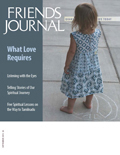


Comments on Friendsjournal.org may be used in the Forum of the print magazine and may be edited for length and clarity.